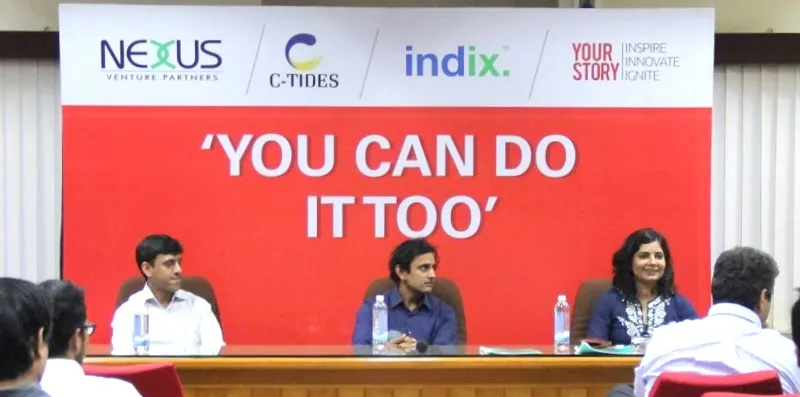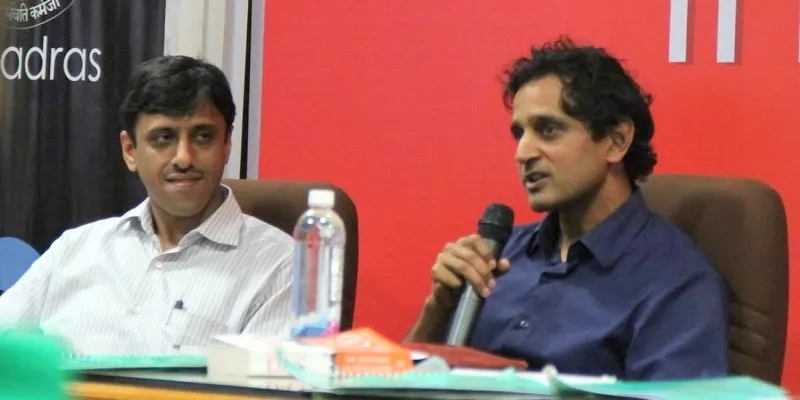‘You can do it too’, say Sridhar Venkatesh and Anup Gupta [YS Fireside Chat Chennai]
It is difficult to compete for mind space against a Bharat Ratna. At IIT Madras, YourStory was pitted against Prof C.N.R. Rao, a passionate and fiery speaker. It is a given that people would prefer attending Prof Rao’s lecture to any other event at the same time. But more than a hundered resisted that pull – and let’s be fair, a third of them were entrepreneurs – to listen to Sridhar Venkatesh of Indix and Anup Gupta of Nexus Venture Partners for a fireside chat with Shradha Sharma of YourStory at the Media Centre of the Central Library at IIT-Madras recently.

A common chord connecting Sridhar and Anup is that they are startup evangelists. Both got off big corporations early on to get into startups. While Sridhar went to San Francisco to drench in the Valley’s startup culture, Anup asked himself a philosophical question, ‘What do you want to do in life?’ The obvious answer was a startup in the US. In their early career, both have played a role in building companies worth billions of dollars.
Over the 50 min-chat, Shridhar and Anup threw light on startup culture, building your company with conviction and the value of co-founding. We distil the various aspects touched upon by Anup and Sridhar as short capsules here.
Choosing startups
- Sridhar: Whether you startup or work in a startup, you are exposed not only to technology but also culture. Startups have a different type of culture and need to fail fast. Startups have less hierarchy. You are not only exposed to various technologies, but also to this vibrant culture. You learn how things are done ground up and how marketing is done. Both are really valuable learning experiences. This is the time in your career (for students looking to startup or joining a startup) to take the risk and accelerate your learning.
- Anup: Startup gives you a rewarding experience. The world is your stage. Even when people fail, they say it has been a rewarding experience. It gives a good perspective, even if you are not successful.
What do you need to startup?
- Sridhar: An idea to begin with, but the idea takes different dimensions over time. First decide on the space you want to focus on. Study the external environment and understand the economics. Identify the opportunity. The next is the team. You can’t do it alone. Then understand what the market is saying and the customer is saying. Build them into your product. Have faith in the journey. Faith and team are the keys to starting up.
- Anup: Even one-founder startups have been successful. But many successful startups have two or more co-founders. Good to have a couple of co-founders who have similar interests. Remember, good companies evolve over time. Do something you are passionate about.

How startups evolve
- Sridhar: Indix started with a bunch of ideas. One was local Search pertaining to just India as Search is largely US and Anglo-centric. We saw an opportunity to build an India-specific Search. The second was making information about products available. Build a database of products. The third was indexing prices of various products. Eventually, we evolved with feedback and talked to a lot of people to focus on building a global database of product information using what is available about features, pricing, and its availability.
In our research, we talked to practically everyone connected with the product space – investors, customers, and others. We figured out that retailers and brands need such information. Finally, we are building the world’s largest database for products. If Facebook brings you people awareness (their likes and opinions) and Google Maps and FourSquare give you place awareness, Indix is about product awareness.
Taking on giants like Google and Amazon
- Sridhar: Early on in my startup journey, we went after multi-billion dollar corporations. You need to believe you can go up against big companies and stand up to them. Despite resources and customer base of a large company, startups can do so much in terms of innovation. Small companies innovate a lot better.
- Anup: Many of Nexus-funded companies go after big companies. What differentiates good companies is focus – what you are going to do and what is that you want to do. Figure out what value your product or service is giving to your customer. Make sure you are the best globally in that area. Being better than someone is not the right attitude. Think about your value proposition and make it strong. Go after the market and talk to people. Innovate on the need. Respond to what customers are telling you and equally on what they are not telling you. Why is someone not buying you? Are you not differentiated or do not bring value? Focus on what you do but you need to strike a fine balance by adapting to feedback. Over 40 years, companies have grown only by adapting to the needs of the customer. It’s important you listen to the market.
Working with co-founders
- Sridhar: Common goals bring co-founders together. It is not necessary that they get along. The relationship hinges on each other’s principles. (Sridhar met Sanjay Parthasarathy, co-founder of Indix, and they were not known to each other before. The relationship formed after a couple of months of conversation.)
- Anup: It’s better to have co-founders with complementary skill sets. Collaborate. Learn to work together. Feel comfortable with the co-founder as a professional.
It’s obvious that apart from the fire you need to startup and sustain, listening to the market and the customers becomes the key to your success as a startup company. It’s a blend of passion and fulfilling customer needs by creating value for them.
The co-founder need not necessarily be your buddy. You can work together as a professional and take the startup to become a global leader in the space you operate. Startup culture is unique. Plunge into it as it’s a learning and rewarding experience.


![‘You can do it too’, say Sridhar Venkatesh and Anup Gupta [YS Fireside Chat Chennai]](https://images.yourstory.com/cs/wordpress/2014/01/YSFSCC1.jpg?mode=crop&crop=faces&ar=16%3A9&format=auto&w=1920&q=75)




